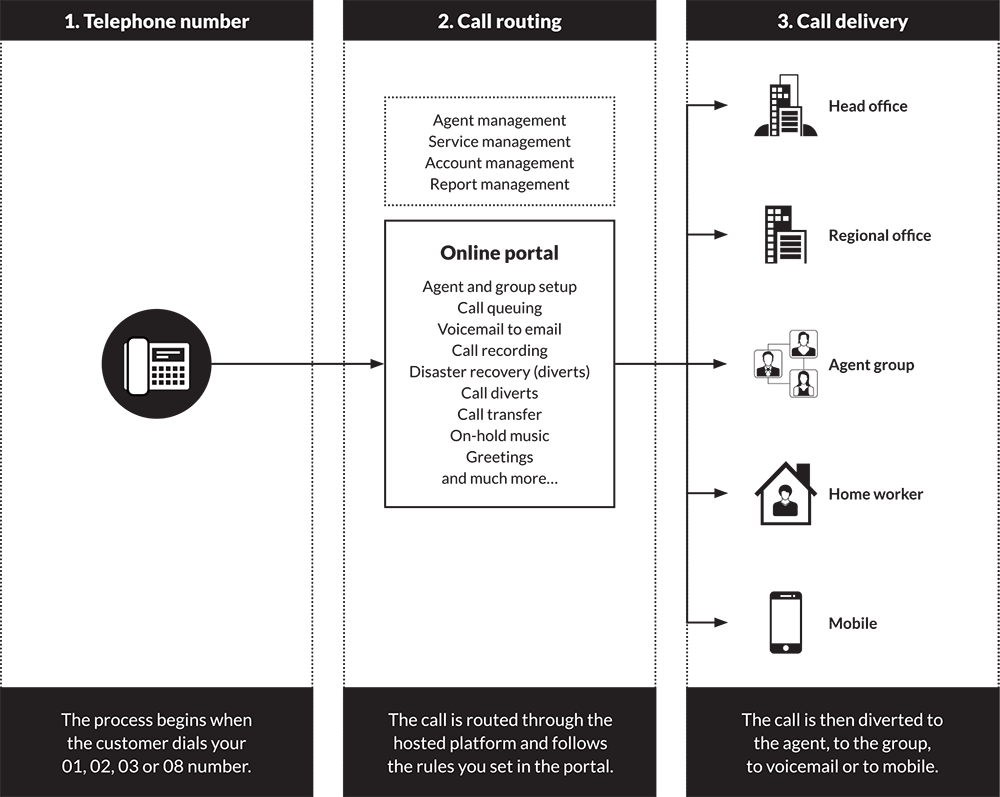Should you switch to a hosted phone system?
Considering ditching your traditional phone system? Want to learn more about hosted telephony? Our comprehensive guide will help you decide if a cloud-based system with VoIP technology is the right solution for your business.
Let’s start by looking at the difference between the two systems and what’s involved in each…
What is a traditional PBX?
A private branch exchange (PBX) is an onsite hardware based telephone system used within an organisation to connect all of the phones in the building. Staff can communicate internally and externally. They have access to a wide range of features such as call recording, call transfer, call queueing and voicemail.
New services are added using additional modules—which can be costly.
Furthermore, you’re also responsible for the repair and maintenance of your system.
So why migrate from a traditional PBX?
Several reasons.
The most important one being that BT will switch off all ISDN phone lines in 2025.
So, if your business still has ISDN, you need to act. It’s imperative that your organisation switches to a hosted VoIP phone system before that deadline.
ISDN switch off aside, there are a few more reasons your business should be moving to hosted telephony:
Traditional PBX limits the number of outside telephone lines you can have. Plus, you’re restricted to the number of internal devices or extensions available. And outside lines for external calls are shared between users.
But the inconvenience doesn’t stop there.
A traditional PBX has its own proprietary phones. This means that if you want to change your system, you also have to change your phones.
Not good.
It’s time to become familiar hosted phone systems.

OK. What is a hosted phone system?
A hosted PBX is an advanced cloud-based phone system that is delivered by your service provider.
For a monthly fee your service provider will handle call routing or switching and cover any maintenance or repairs.
They are responsible for the hardware and software you need.
How does a hosted phone system work?
A hosted phone system can work in 3 different ways:
- Over the internet
- Through a Public Switched Telephone Network (PSTN)
- Via a combination of the two
However, when BT switches off ISDN lines in 2025, PSTN will also be no more.
What is VoIP?
VoIP stands for Voice over Internet Protocol. In simple terms, it is the method by which voice calls are transmitted via the internet.
Your voice is converted into a digital signal and sent in packets using IP telephony – as opposed to traditional circuit transmissions via a PSTN.
Wait a minute. What’s the cloud?
The cloud is basically the internet.
Instead of accessing applications and data from your hard drive, you access them online.
So a cloud-based solution is one that is delivered via the internet.
NOW IS THE TIME TO GET VOIP
CTR CAN HELP YOU SWITCH
Switching to a VoIP cloud-based system isn’t a big deal. If you have sufficient bandwidth, you can probably switch to VoIP without any complications.
CTR has already helped many UK businesses make the transition to a cloud-based system and we can help yours, too.
Don’t be caught out by the ISDN and PSTN switch off. Staying connected with your customers is paramount.
9 benefits of a hosted phone system
1. Cost
One of the foremost benefits of a hosted phone system is cost. A hosted phone line can be less than half the cost of a traditional phone line and call costs are reduced.
Therefore, if you’re looking for a professional phone system without expensive equipment and setup charges, a hosted PBX is an ideal solution.
2. No maintenance or repair costs
Your service provider is responsible for the hardware, the software and any upgrades your system requires.
In other words, you won’t need to employ or hire an IT technician to look after your phone system.
3. Security and business continuity
Your service provider is also responsible for the surveillance of your hosted system.
A good supplier will have the necessary security and disaster recovery procedures in place. As a result, you are ensured of business continuity – even when things go wrong.
Downtime? What downtime?
4. Control
A hosted phone system will give your organisation complete control.
Logging into an online portal allows you to manage your system with ease—wherever you are in the world.
Therefore, it’s accessible 24/7. All you need is an internet connection.

Imagine being able to answer every single phone call that your business receives. Well, with a hosted phone system, you can.
That extra degree of professionalism will instill confidence in your organisation. Hosted telephony makes it easy to set up redirects and diversions so that you never lose a call.
Furthermore, with handy features like mobile twinning – where you can transfer a call made to your office phone direct to your mobile – you can become much more flexible.
5. Scalability
Hosted phone systems can cater for an unlimited numbers of phones. You can add or remove lines and extensions as you need to.
With just a few clicks, a new user can be set up and activated.
And because most cloud-based solutions are charged on a per-user-per-month basis, you’ll only ever pay for what you need.
6. Reliability
With a single cloud platform supporting thousands of business customers in the UK and around the world, a hosted PBX platform is designed to provide the highest degree of reliability and stability.
7. Increased productivity
Cloud-based telephony brings an abundance of features that provide your organisation with an arsenal of tools to increase efficiency.
Video calling, instant messaging and calendar integration mean that your staff can work together in teams even if they are not physically together.
8. Simplicity
Of all the benefits of a hosted phone system, ease of use has to be a good reason to make the transition.
The features of a cloud-based phone system are extremely intuitive and easy to operate. You can even dial a number without having to press any numbers—or even touch the phone.
Moreover, because there is no end-user management, it provides a stress-free solution for your business.
9. Progression
A cloud-based solution is always up-to-date. That means your system will continually evolve in line with your business. Any new services that become available can be instantly accessed.
Progress indeed.

The CTR Solution
Here are the key features you can expect from a hosted VoIP phone system from CTR Services:

CALL RECORDING
Play back recorded calls almost immediately in the CTR portal. Pause and resume to omit payment details.

CONFERENCE ROOM
Your private meeting room for colleagues and customers. Control each session directly in the portal.

BROADWORKS ANYWHERE
Have the ability to push and pull live calls between your IP desk phone and mobile for total mobility and flexibility.

HOT-DESKING
A feature that means you can easily move seats if you operate a flexible seating policy in the office or across sites.

CALL SCREENING
Automatically block withheld Caller ID numbers and/or specific numbers—or send them to voicemail.

FOLLOW ME
A practical mobile twinning function, so that your mobile will ring at the same time as your desk phone.

SHARED CALL APPEARANCE
Multi-phone support means you can have several devices connected – great for users needing multiple devices.

UNIFIED MESSAGING
Voicemail messages forwarded to your email inbox for ease of access. Play, Save, Delete and Call back in an app.

EXTENSION DIALLING
A free on-net short dialling feature for all users in your business—even if they’re in different countries.
Conclusion
The benefits of a hosted phone system are evident. From cost and reliability to the ease of progression, making the transition to a cloud-based VoIP system will bring enormous gains to your business.
And if we’ve learned anything during the COVID-19 pandemic, it’s that the need for businesses to employ a hosted phone system is even more apparent.
Because hosted telephony means you can be there for your customers when they need you most.
Above all, you need to switch to VoIP before 2025. Because that’s when BT is switching off ISDN and PSTN phone lines.
But don’t panic. CTR can help you switch to VoIP seamlessly.





